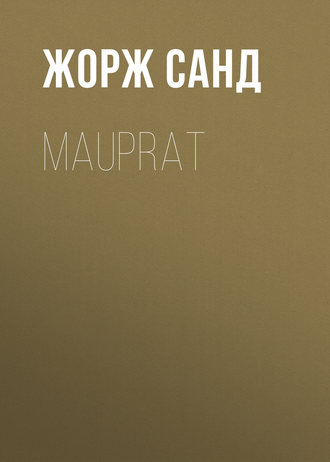 полная версия
полная версияMauprat
“Bernard, I now know that I owe to you the life that I hold dearest in the world. All my own life shall be devoted to giving you proofs of my gratitude and esteem. My daughter also is sacredly indebted to you. You need, then, have no anxiety about your future. I know what persecution and vengeance you exposed yourself to in coming to us; but I know, too, from what a frightful existence my friendship and devotion will be able to deliver you. You are an orphan, and I have no son. Will you have me for your father?”
I stared at the chevalier with wild eyes. I could not believe my ears. All feeling within me seemed paralyzed by astonishment and timidity. I was unable to answer a word. The chevalier himself evidently felt some astonishment; he had not expected to find a nature so brutishly ill-conditioned.
“Come,” he said; “I hope that you will grow accustomed to us. At all events, shake hands, to show that you trust me. I will send up your servant; give him your orders; he is at your disposal. I have only one promise to exact from you, and that is that you will not go beyond the walls of the park until I have taken steps to make you safe from the pursuit of justice. At present it is possible that the charges which have been hanging over your uncles’ heads might be made to fall on your own.”
“My uncles!” I exclaimed, putting my hand to my brow. “Is this all a hideous dream? Where are they? What has become of Roche-Mauprat?”
“Roche-Mauprat,” he answered, “has been saved from the flames. Only a few of the outer buildings have been destroyed; but I undertake to repair the house and to redeem your fief from the creditors who claim it. As to your uncles.. you are probably the sole heir of a name that it behoves you to rehabilitate.”
“The sole heir?” I cried. “Four Mauprats fell last night; but the other three.”
“The fifth, Walter, perished in his attempt to escape. His body was discovered this morning in the pond of Les Froids. Neither John nor Antony has been caught, but the horse belonging to one and a cloak of the other’s, found near the spot where Walter’s body was lying, seem to hint darkly that their fate was as his. Even if one of them manages to escape, he will never dare make himself known again, for there would be no hope for him. And since they have drawn down upon their heads the inevitable storm, it is best, both for themselves and for us, who unfortunately bear the same name, that they should have come to this tragic end – better to have fallen weapon in hand, than to have suffered an infamous death upon the gallows. Let us bow to what God has ordained for them. It is a stern judgment; seven men in the pride of youth and strength summoned in a single night to their terrible reckoning!.. We must pray for them, Bernard, and by dint of good works try to make good the evil they have done, and remove the stains they have left on our escutcheon.”
These concluding words summed up the chevalier’s whole character. He was pious, just, and full of charity; but, with him, as with most nobles, the precepts of Christian humility were wont to fall before the pride of rank. He would gladly have had a poor man at his table, and on Good Friday, indeed, he used to wash the feet of twelve beggars; but he was none the less attached to all the prejudices of our caste. In trampling under foot the dignity of man, my cousins, he considered, had, as noblemen, been much more culpable than they would have been as plebeians. On the latter hypothesis, according to him, their crimes would not have been half so grave. For a long time I shared the conviction myself; it was in my blood, if I may use the expression. I lost it only in the stern lessons of my destiny.
He then confirmed what his daughter had told me. From my birth he had earnestly desired to undertake my education. But his brother Tristan had always stubbornly opposed this desire. There the chevalier’s brow darkened.
“You do not know,” he said, “how baneful have been the consequences of that simple wish of mine – baneful for me, and for you too. But that must remain wrapped in mystery – a hideous mystery, the blood of the Atridae..”
He took my hand, and added, in a broken voice:
“Bernard, we are both of us victims of a vicious family. This is not the moment to pile up charges against those who in this very hour are standing before the terrible tribunal of God; but they have done me an irreparable wrong – they have broken my heart. The wrong they have done you shall be repaired – I swear it by the memory of your mother. They have deprived you of education; they have made you a partner in their brigandage; yet your soul has remained great and pure as was the soul of the angel who gave you birth. You will correct the mistakes which others made in your childhood; you will receive an education suitable to your rank. And then, Bernard, you will restore the honour of your family. You will, won’t you? Promise me this, Bernard. It is the one thing I long for. I will throw myself at your knees if so I may win your confidence; and I shall win it, for Providence has destined you to be my son. Ah, once it was my dream that you should be more completely mine. If, when I made my second petition, they had granted you to my loving care, you would have been brought up with my daughter and you would certainly have become her husband. But God would not have it so. You have now to begin your education, whereas hers is almost finished. She is of an age to marry; and, besides, her choice is already made. She loves M. de la Marche; in fact, their marriage is soon to take place. Probably she had told you.”
I stammered out a few confused words. The affection and generous ideas of this noble man had moved me profoundly, and I was conscious of a new nature, as it were, awakening within me. But when he pronounced the name of his future son-in-law, all my savage instincts rose up again, and I felt that no principle of social loyalty would make me renounce my claim to her whom I regarded as my fairly won prize. I grew pale; I grew red; I gasped for breath. Luckily, we were interrupted by the Abbe Aubert (the Jansenist cure), who came to inquire how I was after my fall. Then for the first time the chevalier heard of my accident; an incident that had escaped him amid the press of so many more serious matters. He sent for his doctor at once, and I was overwhelmed with kind attentions, which seemed to me rather childish, but to which I submitted from a sense of gratitude.
I had not dared to ask the chevalier for any news of his daughter. With the abbe, however, I was bolder. He informed me that the length and uneasiness of her sleep were causing some anxiety; and the doctor, when he returned in the evening to dress my ankle, told me that she was very feverish, and that he was afraid she was going to have some serious illness.
For a few days, indeed, she was ill enough to cause anxiety. In the terrible experience she had gone through she had displayed great energy; but the reaction was correspondingly violent. For myself, I was also kept to my bed. I could not take a step without feeling considerable pain, and the doctor threatened that I should be laid up for several months if I did not submit to inaction for a few days. As I was otherwise in vigorous health, and had never been ill in my life, the change from any active habits to this sluggish captivity caused me indescribable ennui. Only those who have lived in the depths of woods, and experienced all the hardships of a rough life, can understand the kind of horror and despair I felt on finding myself shut up for more than a week between four silk curtains. The luxuriousness of my room, the gilding of my bed, the minute attentions of the lackeys, everything, even to the excellence of the food – trifles which I had somewhat appreciated the first day – became odious to me at the end of twenty-four hours. The chevalier paid me affectionate but short visits; for he was absorbed by the illness of his darling daughter. The abbe was all kindness. To neither did I dare confess how wretched I felt; but when I was alone I felt inclined to roar like a caged lion; and at night I had dreams in which the moss in the woods, the curtain of forest trees, and even the gloomy battlements of Roche-Mauprat, appeared to me like an earthly paradise. At other times, the tragic scenes that had accompanied and followed my escape were reproduced so vividly by my memory that, even when awake, I was a prey to a sort of delirium.
A visit from M. de la Marche stirred my ideas to still wilder disorder. He displayed the deepest interest in me, shook me by the hand again and again, and implored my friendship, vowed a dozen times that he would lay down his life for me, and made I don’t know how many other protestations which I scarcely heard, for his voice was like a raging torrent in my ears, and if I had had my hunting-knife I believe I should have thrown myself upon him. My rough manners and sullen looks astonished him very much; but, the abbe having explained that my mind was disturbed by the terrible events which had happened in my family, he renewed his protestations, and took leave of me in the most affectionate and courteous manner.
This politeness which I found common to everybody, from the master of the house to the meanest of his servants, though it struck me with admiration, yet made me feel strangely ill at ease; for, even if it had not been inspired by good-will towards me, I could never have brought myself to understand that it might be something very different from real goodness. It bore so little resemblance to the facetious braggadocio of the Mauprats, that it seemed to me like an entirely new language, which I understood but could not speak.
However, I recovered the power of speech when the abbe announced that he was to have charge of my education, and began questioning me about my attainments. My ignorance was so far beyond anything he could have imagined that I was getting ashamed to lay it all bare; and, my savage pride getting the upper hand, I declared that I was a gentleman, and had no desire to become a clerk. His only answer was a burst of laughter, which offended me greatly. He tapped me quickly on the shoulder, with a good-natured smile, saying that I should change my mind in time, but that I was certainly a funny fellow. I was purple with rage when the chevalier entered. The abbe told him of our conversation and of my little speech. M. Hubert suppressed a smile.
“My boy,” he said, in a kind tone, “I trust I may never do anything to annoy you, even from affection. Let us talk no more about work to-day. Before conceiving a taste for it you must first realize its necessity. Since you have a noble heart you can not but have a sound mind; the desire for knowledge will come to you of itself. And now to supper. I expect you are hungry. Do you like wine?”
“Much better than Latin,” I replied.
“Come, abbe,” he continued laughingly, “as a punishment for having played the pedant you must drink with us. Edmee is now quite out of danger. The doctor has said that Bernard can get up and walk a few steps. We will have supper served in this room.”
The supper and wine were so good, indeed, that I was not long in getting tipsy, according to the Roche-Mauprat custom. I even saw they aided and abetted, in order to make me talk, and show at once what species of boor they had to deal with. My lack of education surpassed anything they had anticipated; but I suppose they augured well from my native powers; for, instead of giving me up, they laboured at the rough block with a zeal which showed at least that they were not without hope. As soon as I was able to leave my room I lost the feeling of ennui. The abbe was my inseparable companion through the whole first day. The length of the second was diminished by the hope they gave me of seeing Edmee on the morrow, and by the kindness I experienced from every one. I began to feel the charm of these gentle manners in proportion as I ceased to be astonished at them. The never-failing goodness of the chevalier could not but overcome my boorishness; nay, more, it rapidly won my heart. This was the first affection of my life. It took up its abode in me side by side with a violent love for his daughter, nor did I even dream of pitting one of these feelings against the other. I was all yearning, all instinct, all desire. I had the passions of a man in the soul of a child.
IX
At last, one morning after breakfast, Mr. Hubert took me to see his daughter. When the door of her room was opened I felt almost suffocated by the warm-scented air which met me. The room itself was charming in its simplicity; the curtains and coverings of chintz, with a white ground. Large china vases filled with flowers exhaled a delicate perfume. African birds were sporting in a gilded cage, and singing their sweet little love songs. The carpet was softer to the feet than is the moss of the woods in the month of March. I was in such a state of agitation that my eyes grew more and more dim every moment. My feet caught in one another most awkwardly, and I kept stumbling against the furniture without being able to advance. Edmee was lying on a long white chair, carelessly fingering a mother-of-pearl fan. She seemed to me even more beautiful than before, yet so changed that a feeling of apprehension chilled me in the middle of my ecstasy. She held out her hand to me; I did not like to kiss it in the presence of her father. I could not hear what she was saying to me – I believe her words were full of affection. Then, as if overcome with fatigue, she let her head fall back on the pillow and closed her eyes.
“I have some work to do,” said the chevalier to me. “Stay here with her; but do not make her talk too much, for she is still very weak.”
This recommendation really seemed a sarcasm. Edmee was pretending to be sleepy, perhaps to conceal some of the embarrassment that weighed on her heart; and, as for myself, I felt so incapable of overcoming her reserve that it was in reality a kindness to counsel silence.
The chevalier opened a door at one end of the room and closed it after him; but, as I could hear him cough from time to time, I gathered that his study was separated from his daughter’s room only by a wooden partition. Still, it was bliss to be alone with her for a few moments, as long as she appeared to be asleep. She did not see me, and I could gaze on her at will. So pale was she that she seemed as white as her muslin dressing-gown, or as her satin slippers with their trimming of swan’s down. Her delicate, transparent hand was to my eyes like some unknown jewel. Never before had I realized what a woman was; beauty for me had hitherto meant youth and health, together with a sort of manly hardihood. Edmee, in her riding-habit, as I first beheld her, had in a measure displayed such beauty, and I had understood her better then. Now, as I studied her afresh, my very ideas, which were beginning to get a little light from without, all helped to make this second tete-a-tete very different from the first.
But the strange, uneasy pleasure I experienced in gazing on her was disturbed by the arrival of a duenna, a certain Mademoiselle Leblanc, who performed the duties of lady’s maid in Edmee’s private apartments, and filled the post of companion in the drawing-room. Perhaps she had received orders from her mistress not to leave us. Certain it is that she took her place by the side of the invalid’s chair in such a way as to present to my disappointed gaze her own long, meagre back, instead of Edmee’s beautiful face. Then she took some work out of her pocket, and quietly began to knit. Meanwhile the birds continued to warble, the chevalier to cough, Edmee to sleep or to pretend to sleep, while I remained at the other end of the room with my head bent over the prints in a book that I was holding upside down.
After some time I became aware that Edmee was not asleep, and that she was talking to her attendant in a low voice. I fancied I noticed the latter glancing at me from time to time out of the corner of her eye in a somewhat stealthy manner. To escape the ordeal of such an examination, and also from an impulse of cunning, which was by no means foreign to my nature, I let my head fall on the book, and the book on the pier-table, and in this posture I remained as if buried in sleep or thought. Then, little by little, their voices grew louder, until I could hear what they were saying about me.
“It’s all the same; you have certainly have chosen a funny sort of page, mademoiselle.”
“A page, Leblanc! Why do you talk such nonsense? As if one had pages nowadays! You are always imagining we are still in my grandmother’s time. I tell you he is my father’s adopted son.”
“M. le Chevalier is undoubtedly quite right to adopt a son; but where on earth did he fish up such a creature as that?”
I gave a side glance at them and saw that Edmee was laughing behind her fan. She was enjoying the chatter of this old maid, who was supposed to be a wag and allowed perfect freedom of speech. I was very much hurt to see my cousin was making fun of me.
“He looks like a bear, a badger, a wolf, a kite, anything rather than a man,” continued Leblanc. “What hands! what legs! And now he has been cleaned up a little, he is nothing to what he was! You ought to have seen him the day he arrived with his smock and his leather gaiters; it was enough to take away one’s breath.”
“Do you think so?” answered Edmee. “For my part, I preferred him in his poacher’s garb. It suited his face and figure better.”
“He looked like a bandit. You could not have looked at him properly, mademoiselle.”
“Oh! yes, I did.”
The tone in which she pronounced these words, “Yes, I did,” made me shudder; and somehow I again felt upon my lips the impress of the kiss she had given me at Roche-Mauprat.
“It would not be so bad if his hair were dressed properly,” continued the duenna; “but, so far, no one had been able to persuade him to have it powdered. Saint-Jean told me that just as he was about to put the powder puff to his head he got up in a rage and said, ‘Anything you like except that confounded flour. I want to be able to move my head about without coughing and sneezing.’ Heavens, what a savage!”
“Yet, in reality, he is quite right. If fashion did not sanction the absurdity, everybody would perceive that it is both ugly and inconvenient. Look and see if it is not more becoming to have long black hair like his?”
“Long hair like that? What a mane. It is enough to frighten one.”
“Besides, boys do not have their hair powdered, and he is still a boy.”
“A boy? My stars! what a brat Boys? Why he would eat them for his breakfast; he’s a regular ogre. But where does the hulking dog spring from? I suppose M. le Chevalier brought him here from behind some plough. What is his name again?.. You did tell me his name, didn’t you?”
“Yes, inquisitive; I told you he is called Bernard.”
“Bernard! And nothing else?”
“Nothing, for the present. What are you looking at?”
“He is sleeping like a dormouse. Look at the booby. I was wondering whether he resembled M. le Chevalier. Perhaps it was a momentary error – a fit of forgetfulness with some milk-maid.”
“Come, come, Leblanc; you are going too far.”
“Goodness gracious, mademoiselle, has not M. le Chevalier been young like any other man? And that does not prevent virtue coming on with years, does it?”
“Doubtless your own experience has shown you that this is possible. But listen: don’t take upon yourself to make fun of this young man. It is possible that you have guessed right; but my father requires him to be treated as one of the family.”
“Well, well; that must be pleasant for you, mademoiselle. As for myself, what does it matter to me? I have nothing to do with the gentleman.”
“Ah, if you were thirty years younger.”
“But did your father consult you, mademoiselle, before planting yon great brigand in your room?”
“Why ask such a question? Is there anywhere in the world a better father than mine?”
“But you are very good also… There are many young ladies who would have been by no means pleased.”
“And why, I should like to know? There is nothing disagreeable about the fellow. When he has been polished a little.”
“He will always be perfectly ugly.”
“My dear Leblanc, he is far from ugly. You are too old; you are no longer a judge of young men.”
Their conversation was interrupted by the chevalier, who came in to look for a book.
“Mademoiselle Leblanc is here, is she?” he said in a very quiet tone. “I thought you were alone with my son. Well, Edmee, have you had a talk with him? Did you tell him that you would be his sister? Are you pleased with her, Bernard?”
Such answers as I gave could compromise no one. As a rule, they consisted of four or five incoherent words crippled by shame. M. de Mauprat returned to his study, and I had sat down again, hoping that my cousin was going to send away her duenna and talk to me. But they exchanged a few words in a whisper; the duenna remained, and two mortal hours passed without my daring to stir from my chair. I believe Edmee really was asleep this time. When the bell rang for dinner her father came in again to fetch me, and before leaving her room he said to her again:
“Well, have you had a chat?”
“Yes, father, dear,” she replied, with an assurance that astounded me.
My cousin’s behaviour seemed to me to prove beyond doubt that she had merely been trifling with me, and that she was not afraid of my reproaches. And yet hope sprang up again when I remembered the strain in which she had spoken of me to Mademoiselle Leblanc. I even succeeded in persuading myself that she feared arousing her father’s suspicions, and that she was now feigning complete indifference only to draw me the more surely to her arms as soon as the favourable moment had arrived. As it was impossible to ascertain the truth, I resigned myself to waiting. But days and nights passed without any explanation being sent, or any secret message bidding me be patient. She used to come down to the drawing-room for an hour in the morning; in the evening she was present at dinner, and then would play piquet or chess with her father. During all this time she was so well watched that I could not exchange a glance with her. For the rest of the day she remained in her own room – inaccessible. Noticing that I was chafing at the species of captivity in which I was compelled to live, the chevalier frequently said to me:
“Go and have a chat with Edmee. You can go to her room and tell her that I sent you.”
But it was in vain that I knocked. No doubt they had heard me coming and had recognised me by my heavy shuffling step. The door was never opened to me. I grew desperate, furious.
Here I must interrupt the account of my personal impressions to tell you what was happening at this time in the luckless Mauprat family. John and Antony had really managed to escape, and though a very close search had been made for them, they had not as yet been captured. All their property was seized, and an order issued by the courts for the sale of the Roche-Mauprat fief. As it proved, however, a sale was unnecessary. M. Hubert de Mauprat put an end to the proceedings by coming forward as purchaser. The creditors were paid off, and the title-deeds of Roche-Mauprat passed into his hands.
The little garrison kept by the Mauprats, made up of adventurers of the lowest type, had met the same fate as their masters. As I have already said, the garrison had long been reduced to a few individuals. Two or three of these were killed, others took to flight; one only was captured. This man was tried and made to suffer for all. A serious question arose as to whether judgment should not also be given against John and Antony de Mauprat by default. There was apparently no doubt that they had fled; the pond in which Walter’s body was found floating had been drained, yet no traces of the bodies had been discovered. The chevalier, however, for the sake of the name he bore, strove to prevent the disgrace of an ignominious sentence; as if such a sentence could have added aught to the horror of the name of Mauprat. He brought to bear all M. de la Marche’s influence and his own (which was very real in the province, especially on account of his high moral character), to hush up the affair, and he succeeded. As for myself, though I had certainly had a hand in more than one of my uncles’ robberies, there was no thought of discussing me even at the bar of public opinion. In the storm of anger that my uncles had aroused people were pleased to consider me simply as a young captive, a victim of their cruelty, and thoroughly well disposed towards everybody. Certainly, in his generous good nature and desire to rehabilitate the family, the chevalier greatly exaggerated my merits, and spread a report everywhere that I was an angel of sweetness and intelligence.









